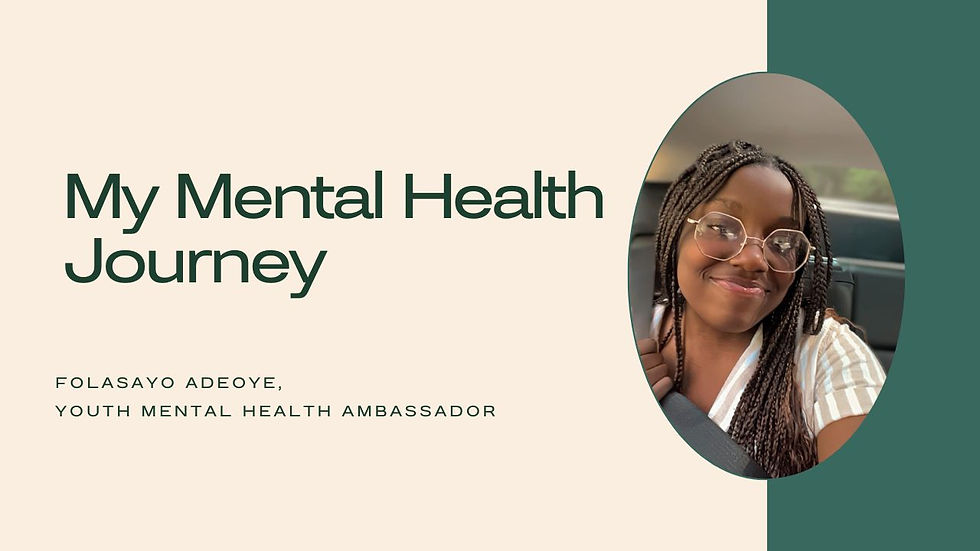My Mental Health Journey
- Folasayo Adeoye

- Jan 2
- 3 min read

I’ve struggled with mental health since I was very young. When I was about five, I would run to my mother at night, saying I had a bad thought that kept playing over and over in my mind. These thoughts were terrifying—images of scary people or even death. Death consumed my thoughts at a young age. I remember constantly asking my parents if they were okay, checking up on them as if their well-being depended on me. Even then, I had death anxiety and social anxiety.
By the time I was 7 or 8 years old, I started experiencing symptoms of OCD. I believed that if I didn’t do things perfectly, bad things would happen. For example, I’d open and close the fridge multiple times if a bad thought crossed my mind. I did things repeatedly, not because they made sense, but because they needed to "feel right." It felt like my mind was playing truth or dare, and I always picked dare.
When I was 8 or 9, my grandmother, who was like a parent to me, passed away. Her death intensified my fears, and I began having thoughts of wanting to die myself. Suicidal thoughts became a recurring part of my life. I would stare at the knife drawer, dipping into that airy fantasy of death.
When I tried to talk to my parents about what I was feeling, I didn’t have the words to fully explain. I’d say things like, “I’m sad,” “I don’t feel well,” or “I’m scared.” I knew about depression because of antidepressant ads on TV, which ironically always mentioned side effects like suicidal thoughts. But I had never heard anyone openly talk about having depression or anxiety. It made me feel so alone.
I was trapped in a cycle of fear and sadness, blaming myself for everything. It wasn’t until I heard music and watched shows where people opened up about their mental health struggles that I finally felt seen. Marcus’ monologue about depression in Ginny & Georgia and Lele Pons’ interview about living with OCD resonated deeply with me. For the first time, I realized I wasn’t alone.
Inspired by these stories, I started searching for answers. I Googled questions like:
"What is generalized anxiety?"
"What are all the types of OCD?"
"Is it normal to cry during a panic attack?"
Even though the answers were sometimes vague, they gave me a starting point. I remember listening to Psych2Go videos on repeat, hearing the narrator describe feelings I thought no one else had. It felt validating, but I still didn’t know how to move forward. I wondered, How do I deal with this? Should I tell my parents? Am I truly alone in fighting these battles?
The answer was no—I wasn’t alone.
I went to my mom and tried to explain how I was feeling. It wasn’t easy. It took multiple attempts for her to understand, and even then, I felt she didn’t fully get it at first. Frustrated, I stopped trying and tried to handle everything on my own. But things only got worse. One day, I hurt myself badly. At first, it felt like a release, but that feeling quickly turned into fear and shame. I managed to hide my scars for a month before my mom found out. I thought she’d be disappointed in me, and those thoughts made me spiral even more.
That’s when I started therapy. At first, it was online therapy. I remember sitting in an empty parking lot, talking to a therapist on my mom’s phone while she waited at Starbucks. It felt strange and distant. The sessions were irregular—sometimes only once every two months. After two years, I realized I needed more. Over the next four years, I went through four different therapists, trying to find the right fit.
Eventually, I also started taking medication for my anxiety and depression. It wasn’t an easy decision, especially with my dad coming from a culture where mental health wasn’t openly discussed. But I kept pushing forward.
One of the biggest factors in my recovery has been surrounding myself with uplifting people—friends who genuinely care, who check in on me because they want to, not because they feel obligated. I know not everyone has the support system I’ve been fortunate to find. My mom eventually came to understand the importance of therapy, and I’m grateful she advocated for me, even if it took time. School counselors were also a helpful starting point.
If there’s one thing I’ve learned, it’s this: Educate yourself about mental health, whether you’re struggling or not. It really does get better, even if it feels unbearable right now. Even when your thoughts are stuck in a loop, and you feel like you’re drowning, there’s hope.
Reach out. Text lines, crisis chat services, and counselors are there to listen. You’re not alone, and you are so much more than your struggles. Keep living—you’re wonderful.





Kommentare